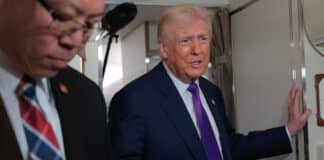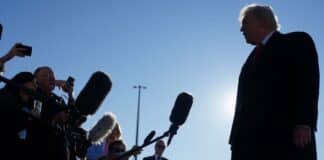President Donald Trump’s diplomatic mission to revive and expand the Abraham Accords is gaining new momentum. Senior adviser Steve Witkoff confirmed ongoing negotiations with several nations, predicting as many as six new countries could join the historic agreement in the coming months.
Witkoff, speaking exclusively to Breitbart News from the White House, detailed the administration’s renewed global outreach. While major peace efforts continue with Iran and the Russia-Ukraine conflict, Trump’s team is actively working to bring new Arab and regional players into normalized relations with Israel. Witkoff described the mood as “big energy” and stated that these initiatives are happening rapidly, with potential breakthroughs expected soon.
Among the surprise potential additions are Lebanon and Syria—nations historically hostile to Israel. Syria’s recent leadership shift following the ouster of Bashar al-Assad has opened the door for possible realignment. Lebanon, still influenced by Hezbollah, has reportedly responded positively to quiet diplomatic overtures. Libya, Armenia, and Azerbaijan are also under consideration, with Witkoff signaling that peace settlements in the Caucasus region could accelerate their path to normalization with Israel.
The centerpiece of Trump’s Middle East strategy remains the potential inclusion of Saudi Arabia. The Gulf powerhouse has yet to officially join the accords but is deeply engaged in negotiations. Trump’s current visit to Saudi Arabia and neighboring Gulf nations marks a crucial phase in those talks. Witkoff noted that solving the Gaza situation is likely a prerequisite for Saudi normalization, which would significantly boost regional stability and cooperation.
Trump’s broader vision ties into the creation of the India-Middle East-Europe Economic Corridor (IMEEC), a strategic counterweight to China’s Belt and Road Initiative. The corridor includes both Israel and Saudi Arabia, making their partnership essential to its success. According to Witkoff, Trump’s approach is rooted in strengthening America’s position through international stability, economic cooperation, and trusted alliances.
Witkoff emphasized that the Trump administration’s foreign policy is built on action and results. The Abraham Accords, initially signed during Trump’s first term with nations like the UAE and Bahrain, had stalled under President Joe Biden. With Trump back at the helm, Witkoff confirmed a renewed drive, backed by a capable team working closely with the State Department to capitalize on global opportunities for peace.
Trump’s ongoing Middle East tour, including potential meetings with leaders from Iran, Russia, and Ukraine, positions him as a central figure in multiple international peace efforts. A surprise visit to Turkey to engage in Ukraine-Russia talks and a possible summit with Vladimir Putin and Volodymyr Zelensky remains on the table.
The renewed Abraham Accords push not only reflects Trump’s enduring commitment to peace but also serves as a sharp contrast to Biden-era foreign policy stagnation.





